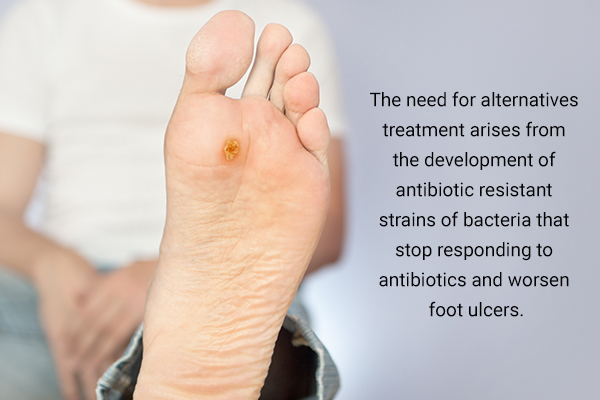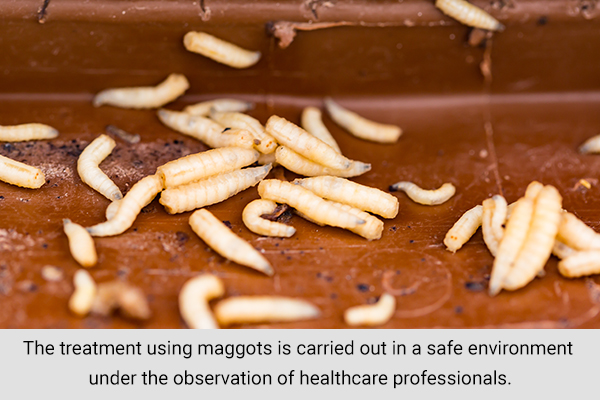In this article:
Foot ulcers are one of the most common complications of uncontrolled diabetes. The rise of blood sugar levels, blockages in blood vessels of the foot and legs, nerve issues, or poor foot care can also contribute to the development of foot ulcers.

If not managed properly, it can lead to amputation and loss of limb. (1)
Treatment for Foot Ulcers
A diabetic foot ulcer can turn into a chronic condition, which never really goes away. If caught early enough, it can be managed with antibiotic ointments to prevent infection. (1)(2)
Hospitalization might also be needed for severe ulcers. (1)
Alternatives to Antibiotic Therapy

The management of foot ulcers is very demanding and may require alternatives to antibiotics. This need also arises from the development of antibiotic-resistant strains of bacteria that stop responding to antibiotics and worsen foot ulcers.
This is where maggot therapy comes in. However controversial it may sound, the American Diabetes Association has been looking into the use of maggots to treat diabetic foot ulcers since the early 90s. (3)
Different species of maggots are used to remove dead tissue, increase the production of newer tissue, and kill bacteria. (4)
A case study of a 74-year-old Brazilian woman found that treatment with maggots, with constant maintenance and removal of eggs, significantly increased the rate of healing by removing dead tissue and eradicating drug-resistant bacteria. (4)
In a more recent study of a 51-year-old man with type 2 diabetes who was repeatedly admitted to the hospital for the treatment of a foot ulcer, traditional methods of wound care failed, but maggot therapy for 10 sessions completely healed his ulcer. (5)
Maggot therapy is performed under medical supervision and is inexpensive and effective enough to reduce the risk of infections, the need for amputation, and even the risk of death. For these reasons, experts highly recommend the use of maggots to hasten the wound healing of diabetic foot ulcers.
Most-Asked Questions About Maggot Therapy
Is it safe to use maggots on human skin?

The treatment using maggots is carried out in a safe environment under the observation of healthcare professionals. Necessary precautions are taken such as sterilization of equipment and larvae of maggots, preventing them from laying eggs on the wounds, and timely removal once the session is over.
If you are still unsure, you can speak to your healthcare provider about your concerns and a suitable treatment plan.
Does maggot therapy hurt?
Patients do report a tickling or prickling sensation. Some report a higher level of pain, which is treated by the use of local painkillers and analgesics.
Final Word
A diabetic foot ulcer – one of diabetes’ most common complications – can adversely affect health. While the most conventional method of treatment is the use of antibiotics, the rise of drug-resistant bacteria can be a major roadblock in the treatment of foot ulcers.
The use of maggots for cleaning and speeding up the process of healing a wound due to ulcers has been around for a long time.
Though not widely used, it has proven time and again to be an effective and inexpensive remedy in removing dead tissue, killing drug-resistant bacteria to prevent infection, and ultimately reducing the need for amputations.
- Was this article helpful?
- YES, THANKS!NOT REALLY


